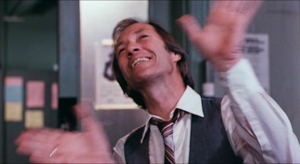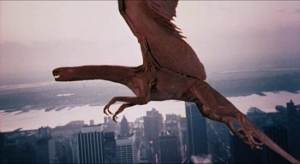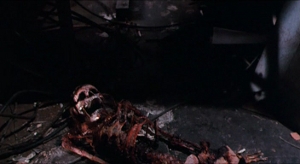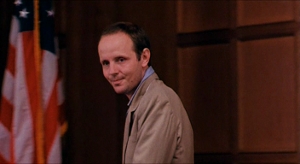
What do you do when you’re fired from a crappy movie? If you’re Larry Cohen, circa 1982, you get right back on the horse, call up Samuel Arkoff, raise a cool million, and go make another one. Why waste a good hotel stay in New York? I can think of few things I’d rather do to that damn town than terrorize it with a giant monster, a proclivity Cohen seems to share. He apparently looked up at the Chrysler Building one day and said, “You know…that’d be a great place to build a nest”…a comment eerily evocative of Charles Joseph Whitman‘s first reaction to the University of Texas clock tower.
Thus, Q, which opens high above the canyons of Manhattan. A window washer outside the fortieth floor of the Empire State Building looses his head to unseen forces. Detective Shepherd (David “Kwai Chang Caine” Carradine) is on the case. His Token Black Partner, Powell (Richard “Shaft” Roundtree) discovers a skinned corpse in a hotel room. And, in the Obligatory Tit Shot, a topless Park Avenue sunbather gets snatched off her own roof by a shrieking, winged shape that dives out of the sun. Blood rains down on Central Park as shoppers and old ladies look the sky, aghast, no doubt wondering, if the Apocalypse is imminent, why they haven’t been Raptured up to Heaven yet? (God must know about that time you masturbated to Johnny Carson’s opening monologue, sweetheart.)

Meanwhile, in Movie B, small time getaway driver and occasional jazz pianist Jimmy Quin (Michael Moriarty) picks up a job robbing (snicker) Neil Diamonds. The plan, of course, goes horribly wrong. Jimmy ends up alone sans both his keys and loot. Let me just say, Jimmy’s damn lucky he’s in New York. This is exactly the kind of amateur shit that turns you into a statistic in Los Angeles, Metropolis, or Gotham. But because this is a Larry Cohen film, Jimmy ends up hiding out in the highest levels of the Chrysler Building…where he finds the nest Cohen dreamed of, complete with an unhatched egg the size of your average Jerry Springer guest. Astonished by this, Jimmy’s tries to piss in the corner, only to be punished by a Spring Loaded Skeleton, stripped of all its flesh. He decides not to steal the corpse’s gold bracelet and finally figures out he’s blundered into a giant monster’s den, just in time for ol’ Mamma Bird to return home.
Meanwhile, construction workers disappear off skyscrapers and Shepherd pursues the corpse skinner (or skinners) running around all over town, chasing whatever connection might or might not exist between them. A striped-tied Museum Curator (Larkin Ford) theorizes that a cult of fervent Aztecs lured that skinned man Powell found to New York, the better to offer him up as a sacrifice to their god, the feathered serpent Quetzalcoatl. Shepherd seizes on this. “If I can kill it,” he tells his girlfriend, “it’s not a god. Just a good, old fashioned monster.” He never questions the validity of such a monster’s existence, not even for a moment, no matter how weird the advice of his academic sources becomes. I wonder, did his New York suffer from a giant, rampaging ape attack sometime in the early 1930s? We’ll never know…

On the other hand, Jimmy’s near-nervous breakdown in his girlfriend’s apartment is the most realistic-feeling reaction to daikaiju I have ever seen on film. His girl, Joan (Candy Clark), talks him down but fails to understand the gravity of the situation. (Ah, the beauty of co-dependency.) Good thing she’s out when Jimmy’s “partners” in crime, Webb (Tony Page) and Doyle (John Capodice) come a’knockin’. After a brief chase and public beat down, Jimmy leads them to the Chrysler Building…where Quetzalcoatl makes short, squishy work of both heavies as Jimmy, overjoyed, cheers it on.
But all is not wine and roses. Doyle and Webb’s rough handling of the security guard puts Jimmy afoul of the police. But by now, co-op condo dwellers are also vanishing from rooftop pools, carried off by what witnesses swear was a giant “bird.” Shepherd channels Shatner as he shares his giant bird theory (“You know, birds are six times stronger than men for their size. And some of them have to eat up to seven times just to stay alive.”) within Jimmy’s earshot. The ritual murders and mutilations “awakened it from its centuries of sleep. This thing was prayed back into existence.” Thus our two plots collide with a line that could’ve only been delivered by David Carradine, and what was an uneven hybrid of the giant monster and crime genres becomes a morality play torn from the pages of…an ABC After School Special script. Because Jimmy is a down-on-his-luck ex-con with Something To Prove, a need to Be Somebody, he does what any decent American would do and blackmails the city, asking for immunity and his own briefcase full o’ money before revealing the location of the creature’s nest.

Shepherd has his own problems. Higher-ups greet his report about ancient gods, their modern cults, and the metaphysical powers of human sacrifice, with a dismissive sneer and orders to fugetaboutit, in the best New York tradition. Will he uncover the mystery of the Aztec Human Sacrifices? Will Jimmy do the just, moral thing, and point the cops towards Momma Bird? Will Joan finally grow some self respect and leave his sorry ass in the clink, where it belongs? Will David Carradene’s smile ever cease to frighten me?
American daikaiju movies can be, occasionally, weird…and Larry Cohen is the king of weird cinema. A long-suffering Job of the 1970s horror upsurge (whence he created, among other things, the classic It’s Alive), Cohen here uses the grammar of the daikaiju picture to explore his own, ambivalent relationship with the God. But whereas, in a previous Cohen film, the divine turned out to be an alien invasion…or some damn thing…here, God is mistaken for a giant reptile, whom everyone keeps mistaking for a bird. “What else is God,” a shades-wearing Professor asks Shepherd (and how loaded a name is that?), “but an invisible force that we fear? For centuries we’ve tried to make it into our image…perhaps its only our vanity…perhaps at one time the whole world was cover with these types of birds, and then they became extinct. Or, almost extinct.”

Perhaps. But Q is, fairly obviously, a stop-motion puppet, poorly superimposed onto many a sweeping, helicopter shot of midtown Manhattan. These shots – Q’s own Evil POV Cam – are easily the most beautiful in the film, and the bits of wooden, cliched dialogue sprinkled throughout make me wish Cohen had shot the entire thing from Q’s elevated perspective. But like so many American kaiju, Q is less than dynamic in spite of the metaphysical trappings Cohen uses to beef up his script. Don’t expect cogent analysis of the Theodicy Problem, or a nuanced understanding of the place gods have in our modern lives. For Cohen, they’re obviously an excuse to bring his giant “bird” to New York, and give David Carradine something to do with himself (stand around, talking to people…believe it or not, something cops used to do).
The most famous Carradine brother is obviously looking for something to do. His Hard Boiled Police Detective is a little too soft for fans of the form. Why Cohen decided to place cops in a role usually occupied by military officials is beyond me…probably had something to do with either budgetary limitations, or pandering to the crowd that made Dirty Harry famous. The Death Wishers and Chuck Norris fans who like their heroes to chew bricks and shit cement while running down a suspect…whom they’ll inevitably call a “scumbag.” If Carradine seems ambivalent about his role as the Good Cop, Richard Roundtree looks right at home playing the Bad one, and is criminally underused. Perhaps if they two had switched roles…or had roles to play, rather than archetypes…the both of them look like veterans giving rushed performances under the minimal supervision of a director/writer/producer with one eye on the clock and the other on Michael Moriarty.

And for good reason. Thanks to his moral ambivalence, and the time Cohen spends exploring its little ends and outs, Jimmy Quinn is the only real character in the film. Venial, cringing, and conflicted, even as he brags about his own moral certitude, Jimmy becomes the perfect portrait of inept criminality. I half expect him to knock on Bill Burrough’s door and plead some money out of the old gentlemen junkie…instead, Jimmy shows a bravery as large as his sense of entitlement, and he (thankfully) avoids Learning Anything from his experiences (other than how to grow a pair) until the film’s cynical and not-at-all-unexpected end. When he’s deep into his role, Moriarty easily outshines every other actor on screen. Next to him, Carradine seems even more wooden and uncomfortable, Roundtree’s Powell even more like a sad, imitation of John Shaft. Only Candy Clark manages to fill out her role as much as Moriarty. Their twin scenes supply the movie’s most cogent ethical debates, never assuming the heavy, clanking noise of Forced Exposition that dogs Carradine’s dialogue.
In spite of all that, Q is frighteningly middle-of-the-road, a film trapped between the quiet, AIP monster movies Arkoff made his fortune on and the big ticket, Action bloodbaths that make fortunes for a lucky few. Larry Cohen was not so lucky as some. He spent the rest of the decade churning out well-made but more-or-less-totally-ignored pictures, pretty much just like this. Yet there’s a creative energy in Q absent most American daikaiju pictures. The Aztec cult sub-plot adds little if anything to the proceedings and, apart from Jun Fukuda, I can’t think of another director who’s even dared to try grafting a caper film onto monster movie. Some judicious editing (or a second draft of the script) might have pulled this strange hybrid out of the doldrums of “eh…it’s a’ight” and into the heights of greatness.

Q coulda been a contender. With more time and money, it might’ve even become a classic, the first salvo of a B-movie New Wave. Instead, it remains a unique but flawed experiment, a tiny, hopeful light in he cinematic dead zone of the early 1980s, when we all twiddled our thumbs and waited for the world’s end, or Godzilla’s return, whichever came first. A Rodan rip-off, by way of King Kong, Q will waste your time with a minimum of pain and a few chuckles to boot. What more could you expect?
![]()
![]()

I just got done watching this turd, as whiney as Moriarty’s character was, at least he knew who he was supposed to be. (unlike David Carradine)
Maybe Carradine just can’t play a convincing good guy.
I also LOVED the sound effects as the “bird” vanquished it’s prey…a very distinguishing cartoon “CHOMP”!!! HE,HE,HE!!!